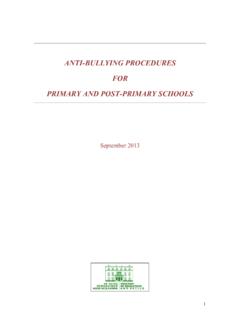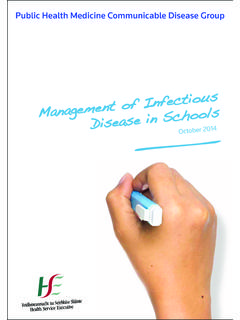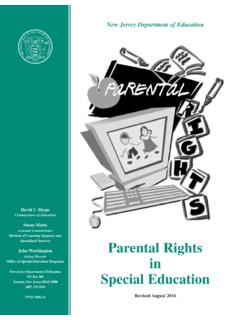Transcription of School Refusal - Department of Education and Skills
1 Roscommon School Refusal Resource Pack 0 This Resource Pack is based on current knowledge in this area. It is intended as a guide only. Not all the suggestions here will apply to any one student or situation. March 2018 Roscommon School Refusal Resource Pack Information for Schools and Parents A collaboration between Roscommon CAMHS, PCCC Psychology, EWO, NEPS and Tusla Family Support Services Roscommon School Refusal Resource Pack 1 We wish to acknowledge with gratitude our colleagues in the South East; Department of Child and Adolescent Psychiatry (DCAP) Waterford & National Educational Psychological Service (NEPS), Waterford who were the first to devise a formal interagency approach to School Refusal and from whose document School Refusal , Good Practice Guide for Schools we have borrowed heavily.
2 October School Refusal is a challenge that confronts all schools sooner or later, at both Primary and Secondary level. Early recognition and intervention are key to prompt resolution. Where the problem persists or becomes complex, schools often seek the advice and support of outside agencies. However, navigating the system (for example knowing who to contact and when) can pose its own set of challenges. To this end, Tusla Family Support Services, National Educational Psychology Service, Educational Welfare Service, PCCC Psychology (HSE) and the Child and Adolescent Mental Health Service have joined to produce this Resource Pack for Schools and Parents. The suggestions and strategies outlined in this pack are not exhaustive. However, it is hoped that the pack will provide some guidance and support to students, parents and teachers.
3 Roscommon School Refusal Resource Pack 2 CONTENTS PAGE: Topic Page 1. What is School Refusal ? 3 2. What causes School Refusal ? 4-6 3. Information for Parents/Guardians on Possible Precursors to School Refusal 7-8 4. Signs that may be observed in School ? 9 5. Roscommon School Refusal Pathway 10-11 6. What can be helpful for all students in School ? 12-14 7. What can schools do when someone is identified as School refusing? 15-17 8. What if the plan is not working? 18 9. Helping Support your young person back to School 19-20 Appendices 21 Appendix A: EWO Pre Referral Checklist 22-23 Appendix B: School and Parent Checklist 24 Appendix C: Sample Return to School Plans 25-26 Appendix D: Checklist for parents/Guardians 27 Appendix E: Tusla EWO Referral Form 28-30 Appendix F: Useful Contacts 31-32 Appendix G: Resources for Parents/Guardians 33 Appendix H: FAQ S 34-36 References 37 Roscommon School Refusal Resource Pack 3 1.
4 What is School Refusal ? School Refusal behaviour refers to a student s Refusal to attend School or difficulty remaining in classes for an entire day. The problem is pervasive and exacts a heavy toll on students, families and schools if left unaddressed. School Refusal can be defined as the child motivated Refusal to attend School or difficulty remaining in School for an entire day (Lyon & Colter, 2007). Refusal to go to School may happen at any age but most typically occurs in children 5-7 years of age and in those 11-14 years of age. Generally, the young person refuses to attend School and experiences significant distress about the idea of attending School . Young persons who refuse School do not typically engage in antisocial behaviour that is associated with truancy, such as lying, stealing or destruction of property.
5 It differs from truancy in that the young person is staying at home with the knowledge of the family and despite their efforts to enforce attendance. The behavior is differentiated from parents who deliberately withdraw their young person from School and from youths with significant difficult circumstances such as homelessness that prevent adequate School attendance. There are many reasons why a student may refuse to attend School or remain in School . These include; Social and peer related difficulties Learning and curriculum difficulties Difficulties with the physical environment Starting School , moving, and other stressful life events may trigger the onset of School Refusal . Other reasons include the young person s fear that something will happen to a parent while he/she is in School , fear that she won t do well in School , or fear of another student.
6 The young person possibly wants to do something more enjoyable outside of School , like practice hobbies, play computer games, watch movies, meet with friends etc. School Refusal is a significant difficulty affecting many students, families and schools. It is a serious issue that is best managed early. Long absences mean that children miss out on important parts of the curriculum, which is detrimental to their learning and development. Early identification of a potential difficulty is a key factor in addressing problems in this area. At this stage, there are strategies and interventions that School , class teachers and parents can adopt. Roscommon School Refusal Resource Pack 4 2. What causes School Refusal ? There are lots of reasons why a young person might refuse School , and pinpointing the cause can be difficult.
7 Often there are a number of factors that contribute to a young person s non-attendance. It is important to understand and address underlying issues when supporting young persons to return to School or attend consistently. Predisposing Factors include; Student s temperament Environmental factors Family context including parental mental and/or physical health and coping Skills Inconsistent parent discipline style Marital disharmony Parental Over-protectiveness The following factors can be involved in School Refusal ; A parent being ill ( School Refusal can begin after the parent recovers) Parents separating, having marital problems, or having frequent arguments. Traumatic events, such as family illness, grief or domestic abuse. A death in the family or a death of a friend of the young person.
8 Moving from one house to another during the first years of primary School . Jealousy of a new infant sibling. Excessive parental worrying about the young person in some way (for example, poor health). Difficulties with transition, such as moving to a new School , returning to School after a long absence due to illness or entering/exiting primary School School factors such as workload and academic pressures, fear or dislike of subjects, finding subjects difficult. Interpersonal Conflict (for example, with peers or teachers). Peer problems, such as social isolation, bullying or conflict between/with friends Anxiety about social situations or activities that involve a performance or evaluation, such as sports days, speaking in front of the class or tests Anxiety around being separated from parents or carers Rewards inherent in staying at home, such as spending time with a parent, watching TV or playing video games.
9 Roscommon School Refusal Resource Pack 5 Bullying can also be a cause of School Refusal . Bullying is unwanted aggressive behavior among School -aged children involving a real or perceived power imbalance that is repeated or has the potential to be repeated over time. Bullying can include threats, intimidation, and/or attacking someone physically or verbally. Signs that a young person may be a victim of bullying include the following: Unexplained injuries Lost or damaged clothes, books, electronic items or jewelry Decline in academic performance especially in maths and reading Avoiding School complaining of headaches, stomach pain, feeling sick Skipping meals or binge eating -- may not eat lunch at School Nightmares and trouble sleeping Sudden loss of friends or avoidance of social situations Decline in self-esteem or feeling helpless New onset of self-destructive behaviors: running away, engaging in deliberate self-harm, suicide threats Factors that reduce the risk of School Refusal Secure relationship between young person and parents (whether united or separated).
10 Co-Parenting - sharing tasks, being consistent, clear and firm Understanding of anxiety and factors that maintain it High levels of support and low levels of stress Student s easy temperament, good coping Skills and an ability to make friends School having the resources and knowledge necessary to provide a supportive environment for the student Cooperation between those involved in supporting the student The student s sense of belonging in School Roscommon School Refusal Resource Pack 6 2. 3 HOW DOES School Refusal COME ABOUT? WHEN School Refusal STARTS Reproduced from School Refusal -Good practice Guide for School , 2015. Roscommon School Refusal Resource Pack 7 3. Information for Parents/Guardians on Possible Precursors to School Refusal Be on the lookout for: Frequent Tearfulness/ distress/ pains in tummy or headaches on Sunday nights or Monday mornings Bedwetting or signs of distress/upset on Sunday nights at the thoughts of going back to School on Monday morning.



















